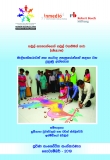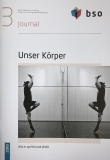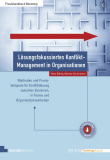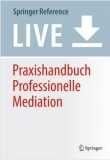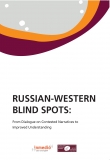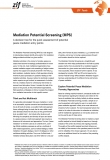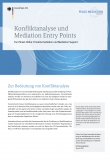Publikationen
Dialogue-Faciliation Training Manual in Sinhala: From shared narratives to joint responsibility (sha:re)
In the framework of our dialogue support project in Sri Lanka 2018-2020 a condensed version of sha:re-training manual (english version) has been published in Sinhala and in Tamil in cooperation with our partners Rainbow Resources Lanka (Colombo) and the Robert Bosch Foundation.
BSO Journal Unser Körper: Auf die Haltung kommt es an! Einsatz von Körpersprache zur Stärkung der Selbstwirksamkeitserwartung und Kreativität
Körpersprachanalyse dient häufig der Widerlegung von Unwahrheiten und beruht auf einer misstrauischen, fal-sifizierenden Grundhaltung. Wir kritisieren diesen Ansatz aus einer konstruktivistischen Perspektive und stellen eine empathiebasierte Alternative sowie dazugehörige Techniken vor, die Vertrauen aufbauen und Klienten stärken.
Lösungsfokussiertes Konflikt-Management in Organisationen
Wirkung und Nutzen von Körpersprache in der Mediation
Sensburg P. (eds) Praxishandbuch Professionelle Mediation. Springer Reference Psychologie.
Springer, Berlin, Heidelberg
Blind Spots in Russian-Western Narratives on European Security
How can we get from contested narratives on the evolution of European Security after 1989 to improved understanding within the OSCE? A Russian-German dialogue project discussed this difficult question at two workshops in Moscow and Berlin. The 20 participants managed to find consensus on a jointly drafted report. Innovatively, the project focused on so-called „blind spots”– events that figure prominently in the narrative of one side, but are overlooked or neglected in the narrative of the other side.
Russian-Western Blind Spots: From Dialogue on Contested Narratives to Improved Understanding
Results of the Dialogue Group's work in the German-Russian Project 'Russia and ‘the West’: Towards a better understanding of what went wrong since the end of the cold war: Joint Analysis of Conflict Narratives and Exploration of Metanarratives' which was funded by the Federal Foreign Office and implemented in 2018.
Mapping: Russian-Western Blind Spots
Mediation Potential Screening
Fact Sheet: Konfliktanalyse und Mediation Entry Points
Konfliktanalyse ist von essenzieller Bedeutung für die Planung und die Gestaltung von Konfliktbearbeitungsverfahren
und insbesondere von Mediationsprozessen. Unzureichende
Analysen werden von Forschern wie Praktikern als einer der häufigsten Gründe für mangelnde
Wirksamkeit oder gar das Scheitern von mediativen Interventionen genannt.
